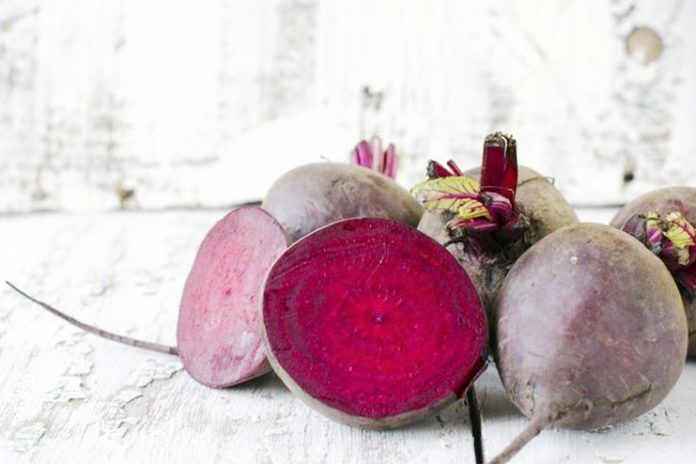Affiliate Disclaimer
Some links in this article are affiliate links. We may earn a small commission if you make a purchase through these links, at no extra cost to you. We only recommend products we find useful to our readersBeetroot (also known as beets) is widely recognized as a superfood due to its impressive health benefits. Often referred to by various names such as table beet, red beet, and garden beet, beetroots are taproots that are typically reddish or purple in color and are fully edible.
They are rich in essential nutrients like magnesium, potassium, iron, vitamins B6, A, and C, and nitrates, all of which contribute to the proper development and functioning of the body.
Beetroots can be consumed raw or cooked, and it is recommended to leave the skin on to retain the full benefits. Beetroot juice, in particular, improves athletic performance, lowers blood pressure, and enhances blood flow.
Additionally, beetroot consumption is beneficial for various health concerns, including improving hair and skin health.
In this article, we will explore the many health benefits of beetroot. Read on to discover how you can make the most of this nutritious vegetable!
Types of Beetroot
Beetroots come in various varieties, each offering unique benefits.
Chioggia – A sweet-tasting Italian heirloom variety with red-and-white striped flesh.
Detroit Dark Red – A popular variety with a deep red, round shape, typically 2½ to 3 inches in diameter.
Formanova – Cylinder-shaped beets that are about 8 inches in length, perfect for uniform slices.
Golden Beets – These unique, carrot-colored roots taste similar to red beets but do not bleed like red beets.
Lutz Green Leaf – This unusual variety grows up to four times larger than most beets. It is sweetest when harvested small.
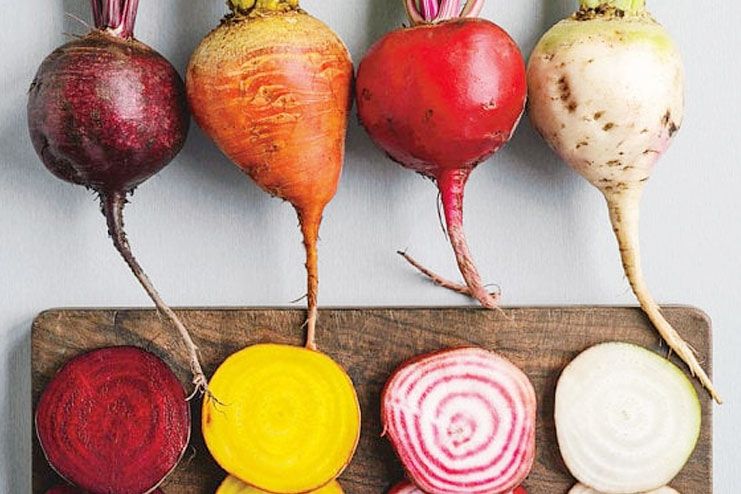
Beet Nutrition Facts
Beetroot is a root vegetable that is low in fat. A ½-cup serving of boiled beets contains 37 calories, 0.15 grams of fat, and 1 gram of protein. The majority of the calories in beets come from carbohydrates, with each serving providing 8 grams of carbohydrates and 2 grams of fiber.
These root vegetables are excellent for boosting immunity, as they are rich in vitamin C, essential minerals, and fiber. The potassium in beets is beneficial for muscle and nerve function.
Manganese enhances the function of the pancreas, kidneys, liver, and bones. Additionally, the vitamin B in beets helps reduce the risk of birth defects.
Nutritional Value Per 100 g (3.5 oz) of Beets (Raw)
Calories: 58
Total Fat: 0.2g (0% Daily Value)
- Saturated Fat: 0g
- Trans Fat: 0g
- Polyunsaturated Fat: 0.1g
- Monounsaturated Fat: 0g
Cholesterol: 0mg (0% Daily Value)
Sodium: 106mg (5% Daily Value)
Total Carbohydrates: 13g (5% Daily Value)
- Dietary Fiber: 3.8g (14% Daily Value)
- Sugars: 9.2g
Protein: 2.2g
Vitamin D: 0mcg (0% Daily Value)
Calcium: 22mg (2% Daily Value)
Iron: 1.1mg (6% Daily Value)
Potassium: 442mg (9% Daily Value)
How to Incorporate Beetroots into Your Diet?
Wondering how to include beetroot in your meals? Fresh beetroot is easy to prepare. Here are a few ideas to get you started:
Salads
Try adding roasted beetroot to a green salad for great flavor. You can complement it with ingredients like soft goat cheese, chopped apples, segmented oranges, toasted nuts, or simply drizzle some vinegar or olive oil for added taste.
Purees
Beetroot puree is a colorful, delicious, and healthy option. Combine boiled potatoes with beetroots, mash them with some butter, and season with salt and pepper for a great dish.
Soups
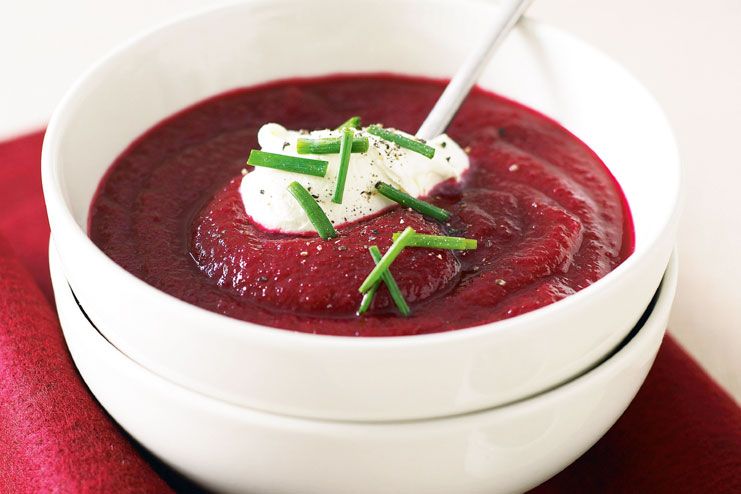
Beetroot soup makes a fantastic starter. Here’s a simple beetroot soup recipe:
Ingredients:
- 3 beetroots, peeled and diced
- 1 liter vegetable stock
- 1 tbsp vinegar
- 1 tbsp sunflower oil
- 1 large onion, chopped
- 1 potato, peeled and diced
- Salt and pepper to taste
- Small bunch of fresh dill, chopped
- Crème fraîche or sour cream for garnish
Instructions:
- Heat oil in a saucepan and fry the onion until soft.
- Add the diced potato and beetroot to the pan.
- Cover the vegetables with vegetable stock.
- Add vinegar, salt, and pepper, and mix well.
- Bring the mixture to a boil, then reduce the heat and cook for 30 minutes on low heat.
- Blend the soup until creamy.
- Serve hot, garnished with chopped dill and a dollop of crème fraîche.
Beetroot Juice
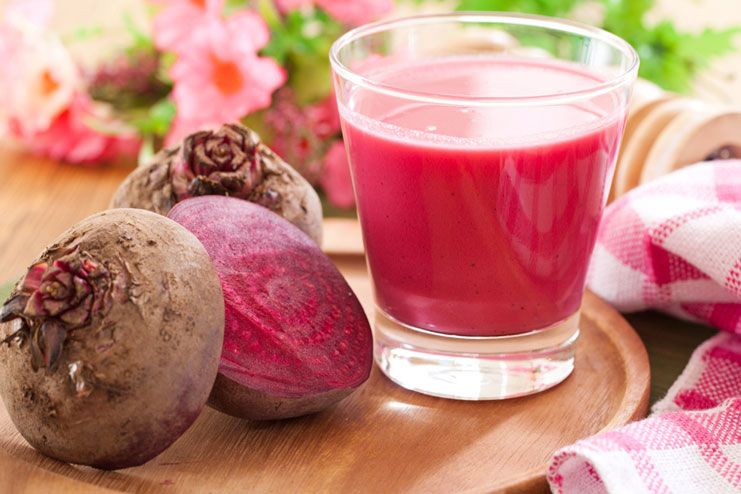
Serve beetroot juice at breakfast to start your day in a healthy and refreshing way. It’s one of the best super juices to kickstart your morning.
Ingredients:
- 1 apple
- 1 beetroot
- 2 celery stalks
- ½ lime or lemon
- 1 carrot
- A small piece of peeled ginger
Instructions:
- Wash all the vegetables and fruits under running water and pat them dry.
- Peel and cut them into long pieces.
- Place the ingredients (except the lemon) into a juicer and juice or blend.
- Squeeze out the juice and then add the lemon juice.
- Drink fresh and enjoy!
Note: You can use any type of apple or other fruits like oranges. If using organic vegetables and fruits, do not peel the skin.
Get the full benefits of beets by drinking beetroot juice daily. Regular consumption can help prevent heart ailments and reduce blood pressure levels.
However, remember to mix it with other fruits or vegetables to prevent the beetroot juice from being too strong or concentrated. The other fruits and vegetables help dilute the juice, making it more palatable.
Health Benefits of Beetroot
- Lowers Blood Pressure
- Good For Heart
- Helps Prevent Cancer
- Good For The Liver
- Boosts Energy Levels
- Increases Bone Health
- Rich in Antioxidants
- Effective in Weight Management
Beauty Benefits of Beetroot
Beetroot Benefits for Hair
Amazing Health Benefits of Beetroot
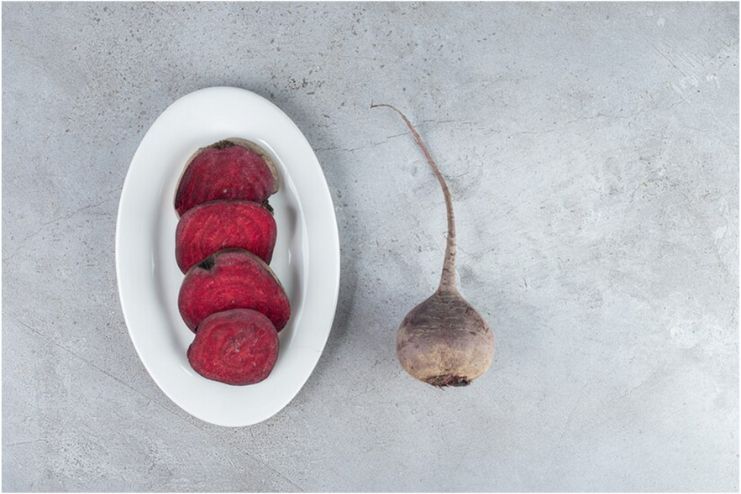
Beets are not only used as food, but they also have medicinal value, treating numerous medical conditions, and even serve as a natural food coloring. Here are some incredible health benefits of beetroot:
Also, Read: Drink These 5 Smoothies to Ease Period Symptoms and Boost Hormonal Health
1. Lowers Blood Pressure
Beets have a strong connection with blood pressure regulation. Beetroot juice has been found to lower blood pressure levels within weeks. The nitrates in beets are converted into nitric oxide in the body, which helps expand blood vessels.
Drinking a glass of beetroot juice daily can quickly positively impact your blood pressure.
2. Good for the Heart
The nitrates in beets help lower blood pressure, reducing the risk of heart attacks and other heart diseases. When oxygen supply to the skeletal muscles is insufficient, it can impair muscle function and reduce arm and leg movements, eventually decreasing physical activity and leading to heart disease.
3. Helps Prevent Cancer
Beetroot extract has shown potential in preventing breast cancer. Beetroot shots have been found to help prevent several types of skin and lung cancers (R). Beetroot juice, when mixed with carrot extract, is also helpful in treating leukemia. Beets have anti-cancer properties and are known as a “friend of the liver” due to their detoxifying effects.
4. Good for the Liver
Beets help eliminate toxins from the liver through their high fiber content. They also protect the liver from oxidative damage. The copper and zinc in beets help protect cells from oxidative stress, contributing to liver health.
5. Boosts Energy Levels
Recent studies have revealed that beetroot enhances muscle efficiency and stamina (R). Consuming at least half a liter of beetroot juice per day can help the lungs cycle 16% longer without exhaustion.
It also increases blood flow and energy levels, reducing muscle fatigue. Beets act as a natural energy source, allowing the body to stay active for longer periods.
Beetroot juice supplementation enhances blood flow to the limbs, improving overall performance.
6. Increases Bone Health
Beetroot is also rich in natural minerals, such as silica, which helps the body utilize calcium effectively. This contributes to strengthening the bones and improving bone health.
7. Reduces Bad Cholesterol
Beetroots are rich in antioxidants, which help boost the immune system. Red-colored beetroots contain betacyanin, an antioxidant known for its effectiveness in reducing LDL, commonly referred to as “bad” cholesterol.
8. Effective in Weight Management
Beetroots are rich in fiber and low in calories, making them highly beneficial for weight loss. They also help remove toxins from the body.
Beauty Benefits of Beetroot
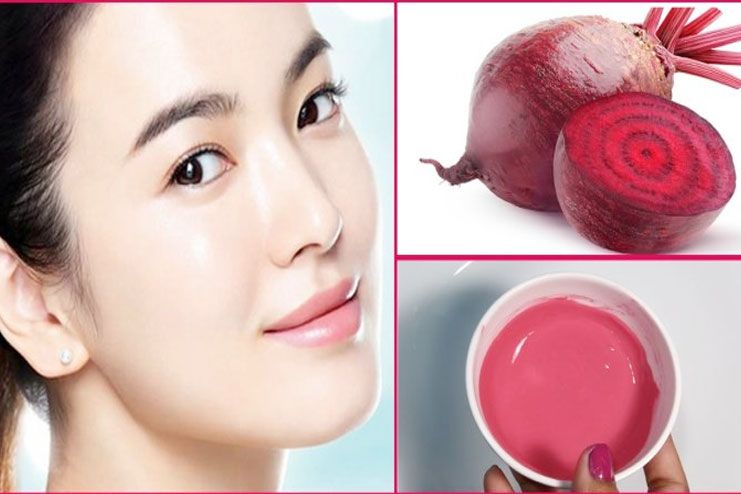
In addition to its health benefits, beetroot offers several beauty benefits, particularly for skin and hair health.
Also, Read: 10 Signs you’re not taking Care of Your Skin as You Age
9. Cures Pimples and Acne
Beetroot juice, with its anti-inflammatory properties, can help achieve acne- and pimple-free skin and reduce stubborn acne scars.
How to Use:
- Mix 2 tbsp of beetroot juice with 1 tbsp of yogurt.
- Apply the mixture to the scars on your face.
- Leave it on until it dries, then wash off.
10. Removes Dead Skin Cells
The iron, minerals, and vitamins found in beetroots contribute to a natural skin glow. Drinking a glass of beetroot juice daily helps cleanse toxins from the body, and when your internal health improves, it reflects on your skin.
Beets also help remove dead skin cells and replace them with new ones, enhancing radiance. Regularly applying beetroot juice to the face helps soothe the skin, reduce dark circles, and eliminate dark spots.
11. Softens Lips
If you’ve always wanted soft, pink lips, beetroot juice can help. Simply apply beetroot juice to your lips every night before bed, and you’ll soon start to see results.
12. Whitens Skin
Beets are a safe and natural option for achieving a lighter skin tone. Instead of relying on cosmetics, drink beetroot juice regularly and apply a mixture of beetroot juice and lemon to your face.
How to Use:
- Mix 1 tbsp of beetroot juice with 1 tbsp of lemon juice.
- Apply the mixture to your face before bed.
- Leave it on for 15 minutes, then wash it off.
13. Prevents Hair Dryness

Beetroots help retain the natural shine and glow of the hair. The nutrients in beets prevent hair dryness and hair loss.
How to Make a Scalp Mask:
- Mix ginger juice and beetroot juice.
- Add a little vinegar.
- Apply the mixture to your dry scalp.
- Wash off after a few minutes.
Isn’t it easy to use beetroot juice to naturally address skin and hair problems? Go ahead and try it after checking for any potential side effects.
Also, Read: 10 Best Collagen Supplements for Hair Growth
Beetroot Side Effects
Beetroot juice is consumed for various health benefits, such as boosting exercise capacity, supporting eye and liver health, and serving as an aphrodisiac. While it is rich in vitamin C, manganese, magnesium, potassium, beta-carotene, and bioflavonoids, concentrated beetroot consumption can have side effects.
1. Iron and Copper Conditions
Excessive beetroot consumption is not recommended for people with Wilson disease or hemochromatosis. This can lead to the accumulation of iron and copper in the body. Hemochromatosis is a condition involving iron overload, while Wilson disease prevents the body from eliminating excess copper.
2. Beeturia
Around 12% to 14% of the population experiences red urine and blood coloration after consuming beetroot, a condition called beeturia. According to the British Medical Journal, beeturia has no apparent harmful consequences.
3. Interactions
Betaine, a compound found in beets, can cause mild side effects such as stomach upset, nausea, and diarrhea. People with kidney disease should avoid betaine, as it may increase total cholesterol levels when taken with vitamin B6 and folic acid. Betaine is also often consumed with vitamins B12, B6, and folic acid, and overweight or obese individuals should consult their doctor before taking it, as it could elevate cholesterol levels.
4. Pregnancy
Pregnant women should exercise caution when consuming betaine. The Mayo Clinic rates it as “C” during pregnancy, which means animal studies have shown adverse effects, but no human studies have been conducted.
Conclusion
Beetroot is a remarkable root vegetable that goes beyond being a mere addition to your meals. Its impressive health benefits include lowering blood pressure, enhancing heart and liver health, and boosting energy levels, while its beauty benefits help improve skin and hair health.
However, like any superfood, beetroot should be consumed in moderation to avoid potential side effects. Using root vegetables of such bright color in your day-to-day life will allow you to reap the maximum possible rewards in improving your health.
Start experiencing beetroot today for a healthier life!
Frequently Asked Questions
1. Are beets good for you to eat daily?
A. Beets offer surprising health and beauty benefits, as they are rich in essential nutrients like iron, B vitamins, copper, manganese, potassium, and magnesium. You can safely consume beets in moderation daily to reap their health-boosting benefits.
2. Can you drink beetroot juice before sleep?
A. Before incorporating beetroot juice into your nighttime routine, consult your doctor to evaluate your health and assess any potential side effects. This will help ensure it’s safe and beneficial for your wellness.
3. What is the best way to have beetroot?
A. Peel the thin skin of raw beets, then steam or roast them gently until they become tender and succulent.
4. Can you eat raw beetroot?
A. Raw beets offer a sweeter flavor compared to cooked beets and can be enjoyed in salads. If you’re looking for unique ways to eat raw beets, consider trying finger sandwiches or ravioli made with raw beetroot.
5. Are beets good for babies?
A. Beets can be introduced to babies between 8 and 10 months old as beetroot puree. Make the puree with peeled, chopped beets, as the peel may not be easily digestible for babies.
6. Is beetroot good for diabetic patients?
A. Beets are beneficial for diabetic patients, especially those with high cholesterol, high blood pressure, or at risk of heart disease. The nutrients in beets help lower glucose levels, making them a good choice for diabetes management. However, consume in moderation and consult a dietitian to manage your daily portion of beets.
7. Is pickled beet good for health?
A. Pickled beets also offer numerous health benefits, as they contain fiber, vitamins, and minerals. The red beet leaves may even help reduce body fat.
8. Can we eat beet skin?
A. The skin of baby beets is tender and can be eaten, much like the skin of other root vegetables such as parsnips, carrots, and potatoes.
-
Jan 2018Written by Sumana Maheswari
-
Feb 2025Edited by Lakshmi Gayatri
In this Article













